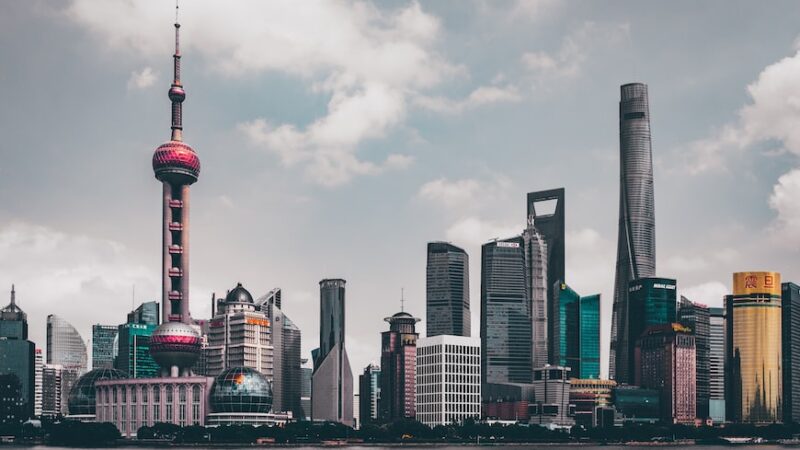How to contain an increasingly assertive China?
Tensions in the South China Sea are on the rise. The United States has just pledged to defend Philippine vessels if they are attacked over there, after Beijing and Manila blamed each other after a China Coast Guard ship fired water cannons at a Philippine boat. The incident may well be deliberately provoked by China to test the commitment of the United States in the region.
A few weeks ago, a record-breaking number of Chinese warships were spotted in waters around Taiwan within a 24 hour period. This was followed by the unexplained firing of China’s foreign minister, Qin Gang, a close ally of Chinese President Xi Xinping. In the same week, Taiwan held major military drills that simulated an invasion of the island, centred around defending vital beaches and airports.
This volatile mix of escalation and uncertainty is breeding a sense of anxiety for China’s regional neighbours who are all in tense dispute with China over its legally baseless claim to the entirety of the South China Sea – and all the vast mineral wealth beneath the waves.
ASEAN – the Association of Southeast Asian Nations – could well play a role here. This is a political and economic union of 10 member states in Southeast Asia. With lingering fears of a Chinese invasion of Taiwan within the next five years, ASEAN nations must build stronger ties between themselves to act as a stable and unified counterweight to China. This would not only help to push back against Chinese aggression in their own waters, but also give support to Taiwan in any eventual outbreak of war. Furthermore, it would alleviate the burden on the United States.
If ASEAN partners do not present a united front on territorial disputes in the South China Sea then the door will be left open for China to isolate certain nations and coerce them into giving in to Chinese demands. Given its rather particular interpretation of international boundaries, it is only a matter of time before China engages in legal warfare to challenge international boundaries, to the extent it has not already.
Malaysia already experienced something along these lines, albeit not coming from China. Last year, a French court ordered it to pay $14.9 billion to the heirs of the last sultan of Sulu, a part of Malaysia whose sovereign enjoyed compensation from the British when they ruled over the area, which is resource-rich. The newly formed Malaysian state simply continued to pay the heirs an annual stipend of $5,300, until in 2013, following an armed incursion from the Philippines by a group claiming to be the heirs. The French court decision to rule in the way it has is highly controversial, to say at least. The arbitrator who issued the award in the case, Gonzalo Stampa, has now even been slapped with criminal charges in Spain over his role.
In sum, even internationally well-accepted boundaries do not seem safe from legal challenges. Looking at how China has been treating Lithuania, after it was deemed too friendly towards Taiwan, Asian countries should not exclude that the increasingly assertive Chinese state tries to turn courts into an extension of its foreign policy domain.
It would be foolish to underestimate the chances of war in Asia breaking out. Decades of smaller scale lopsided conflicts have already blindsided us to the possibility of large-scale devastating conflicts and we can’t allow that to happen again.
One only needs to look at how Russia took advantage of western dithering to launch the largest war this century which has killed thousands and displaced millions across the European continent. The war in Ukraine is predictably capturing the much of the West’s attention given the acute geopolitical headache it poses, but this is allowing China to escalate tensions around Taiwan and the South China Sea under the radar.
A potential war between China and Taiwan is likely to draw in The United States and make Russia’s war against Ukraine look almost trivial in comparison – impoverishing billions and bring ruin to the wider region.
Indonesia has been singled out as one of the ASEAN partners unwilling to fully show solidarity in opposition to China’s territorial stances when it comes to the South China Sea, but it is not the only one. ASEAN trading nations should take notice how even Germany, always wary of conflict and probably the most diplomatically minded of Western nations, has decided to send two warships to the Indo-Pacific in 2024, repeating what it has already done in 2021.
Germany’s purpose is to make clear to China that pursuing good trade ties should not mean allowing just anything. According to German Defence Minister Boris Pistorius, the aim of this move is to demonstrate that Germany is “dedicated to the protection of the rules-based international order that we all signed up to and which we all should benefit from – be it in the Mediterranean, in the Bay of Bengal or in the South China Sea.”
Those ASEAN countries that are still on the fence should take note.



Britain could be left holding the bag over Ukraine
The new Defence Secretary, Grant Shapps, in his first newspaper interview since taking up the position, called for British weapons manufacturers to set up shop in Ukraine and revealed discussions with Zelensky about the Royal Navy getting more involved in the Black Sea.
The biggest potential escalation was his suggestion that British military instructors be moved into Ukraine.
As of yet, the UK and allies have avoided a formal military presence in the conflict due to the risk of direct conflict with Russia, so these were major policy changes being floated.
The same day, former Russian President and now deputy chairman of the country’s influential Security Council, Dmitri Medvedev, posted on Telegram that such moves bring World War Three closer.
‘[This will] turn their instructors into a legal target for our armed forces… understanding perfectly well that they will be ruthlessly destroyed. And not as mercenaries, but namely as British NATO specialists.’
Just over two hours later, the Prime Minister had pushed back at the Defence Secretary’s comments telling reporters on the first day of his party conference there were no immediate plans for this:
Leaving aside Mr Shapps’ questionable ministerial record and lack of obvious suitability for his brief, this incident (which was conveniently brushed under the carpet of the Tory conference) raises some serious questions about decision making at the MoD.
Was this interview cleared with No. 10 and if so, are they now backtracking? Or did the Defence Secretary go off script and unsuccessfully try to use his own initiative?
Or was this government floating an idea and testing the waters? If so, they got their answer quick.
The sight of British soldiers returning in body bags in an election year might not be a big vote winner.
Government’s decision to ramp up support for Ukraine and double down on its all-or-nothing position comes as cracks in the alliance grow wider by the day.
As all this was unfolding, Slovakia was electing its next parliament, with an anti-Ukraine party winning the election. The country has already halted military aid to Kiev, joining the Hungarians.
Just two weeks ago, one of Ukraine’s strongest allies, compared it to ‘a drowning man’.
A dispute over grain exports got so bad that the Polish president said:
This was quickly followed by the Polish prime minister announcing: “We are no longer transferring weapons to Ukraine because we are now arming Poland with more modern weapons.”
Next week will see Poland have its own elections, and like Slovakia, an anti-Ukraine party is doing very well in the polls, with hopes to be kingmaker.
The United States is not immune from political division over the conflict, with various presidential candidates from Donald Trump and Vivek Ramaswamy to Robert F Kennedy Jr calling for its end.
Domestic political pressure and war fatigue aren’t the only factors creating friction between Western capitals. After 20 months of being told victory is round the corner, reality is starting to bite.
This week NATO’s most senior military official told the Warsaw Security forum the West is running out of ammunition for Ukraine. Admiral Rob Bauer said: “The bottom of the barrel is now visible.”
UK Defence Minister James Heappey also added that the West’s stockpiles were ‘looking a bit thin’.
This might explain the eagerness to have British weapons manufacturers ramp up production by setting up factories in Ukraine, but it does not explain the stubborn continuation of a failed strategy.
A policy should be judged by its results and as of writing, Ukraine has lost hundreds of thousands of its young men, millions more have fled, its economy is decimated, and its state is on life-support.
Russia, meanwhile, has weathered the sanction-induced storm which turned out to be a strong breeze rather than the predicted tornado. Its economy has not only held up but is on track to grow.
NATO’s eastern flank, be it Turkey, Hungary, now Slovakia and potentially Poland, is already publicly disagreeing and diverging from the Washington-London line, and this is likely to continue.
And the Washington line, as we have only seen too well over the last decade, is liable to change rapidly depending on the outcome of the next election.
So, can Britain afford to continue its Johnsonian zeal for trying to fight Russia down to the last Ukrainian, or is it time to take back control of our foreign policy and start thinking seriously about Europe’s long-term security architecture?
I would hope that the government concerned with ‘long-term decisions for a brighter future’ would be reassessing its policy.
Photo Credit.